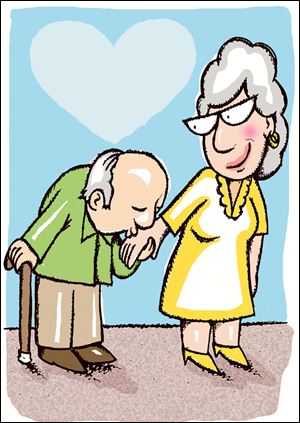
Changing trend: Seniors are latest focus of sex education
Syphilis, chlamydia cases on rise in older groups
8/27/2012
Health-care officials report a rise in sexually transmitted diseases among the nation's elderly population and although detailed statistics are difficult to come by, they know enough to be concerned, to issue warnings, and to try to educate senior citizens about practicing safe sex.
The Centers for Disease Control and Prevention said that in the 55-plus age group in central Florida in the spring of 2011, for example, there was a 71 percent jump in reported cases of syphilis and chlamydia. In south Florida, there was a 60 percent increase in those diseases.
The number of reported cases of STDs among seniors in Ohio and Lucas County doesn't appear to be as alarming.
Authorities have some explanations for the increase, and one of the most obvious is the use of drugs such as Viagra to correct erectile dysfunction.
Moreover, baby boomers who spurred the sexual revolution that shook society more than four decades ago are taking the same approach to sexual freedom into their senior years. And because the elderly don't worry about pregnancy, they apparently are less likely to practice safe sex.
Mary Jay, disease intervention specialist at the Toledo-Lucas County Health Department, said that while those are the big three reasons, the message about the importance of practicing safe sex has not gotten to all of the heterosexual population.
"The gay male population got the message of using protection," she said. Because some gay men lost loved ones to HIV-related deaths, they have been compelled to use protection. "But culturally, [the infection] has not taken the same toll in the heterosexual population. The message [to practice safe sex] didn't permeate as much into the heterosexual community."
Yet even those who understand the importance of practicing safe sex might still be hindered by cultural mores from protecting themselves. In this era, though, those views must be cast aside, and to coin a quote made famous by President Ronald Reagan, Jerry Kerr, HIV prevention coordinator of northwest Ohio, said sex partners should "Trust but verify."
"Don't assume anything about your partner. Go get tested. If you don't do that, [use] a condom," he warned.
Health officials said some senior citizens may be ashamed to purchase condoms from a pharmacy or to obtain them free from the health department.
Anyone can get free condoms simply by going to the health department at 635 N. Erie St. in downtown Toledo. They are held in a container inside the department's front door. About a dozen condoms are inside each pharmacy bag, which looks like a white slender bag that drug stores use to place prescription medications into.
"We encourage people to examine their priorities and put their health above any embarrassment," Mr. Kerr said.
"We need to have a cultural shift," Ms. Jay said.
She added that there needs to be more interest in protecting oneself and one's partner than in worrying about what observers might think or say. Frankly, health officials don't care who's having sex with whom.
They only want people to practice safe sex to protect themselves and their partners. Ms. Jay tells the story of elderly citizens who retrieve free condoms from the health department.
"We have older adults who come [get condoms] and say they are for their grandchildren," she said. "Maybe they are, but we don't care."
Though budget restrictions prevent the department from specifically targeting senior citizens in its outreach efforts, that population is reached when organizations, churches, and festivals invite department officials to their events to give HIV tests.
The test involves using an oral swab and within 20 minutes a person can know whether he or she is HIV positive.
"We have more than 20 HIV test sites, so we test a fair number of older people who get tested for HIV," Mr. Kerr added.
A walk-in clinic is open four days a week, and though no appointment is necessary to get an STD test, it costs $30.
"We have not had an influx of people over 60 coming in for tests or treatment," Mr. Kerr said.
With older people, Dr. Murthy Gokula believes the issue is compounded by misconceptions about sex and views that senior citizens are not sexually active.
Dr. Gokula is a geriatrician, assistant professor in the Department of Family Medicine at the University of Toledo Medical Center, formerly the Medical College Ohio, and program director for the St. Luke's Hospital Geriatrics Fellowship Program.
He offers a quote from Reichel's Care of the Elderly report to correct erroneous notions: "Seventy-one percent of men and 51 percent of women age 60 and older are sexually active." And yet when it comes to elderly patients, too few doctors of elderly patients address the issue.
"Doctors think it's not important to talk about sexual activity. I teach medical students to ask that question," Dr. Gokula said. He noted that inquiries about sexual activity "should be a screening question for all geriatric physicians; [however] only about 10 percent to 12 percent [of doctors] ask."
Elderly patients' responses to whether and how often they are sexually active gives a glimpse into their overall health. Sexually active seniors, he said, are in relatively good health.
"I know that they don't have depression, I know their vascular health is good," he said. "It also tells me that they will age well and live longer and have better outcomes. Good sexual health means a good quality of life. Part of the problem is that we don't recognize that seniors have love and affection for each other."
Contact Rose Russell at: rrussell@theblade.com or 419-724-6178.